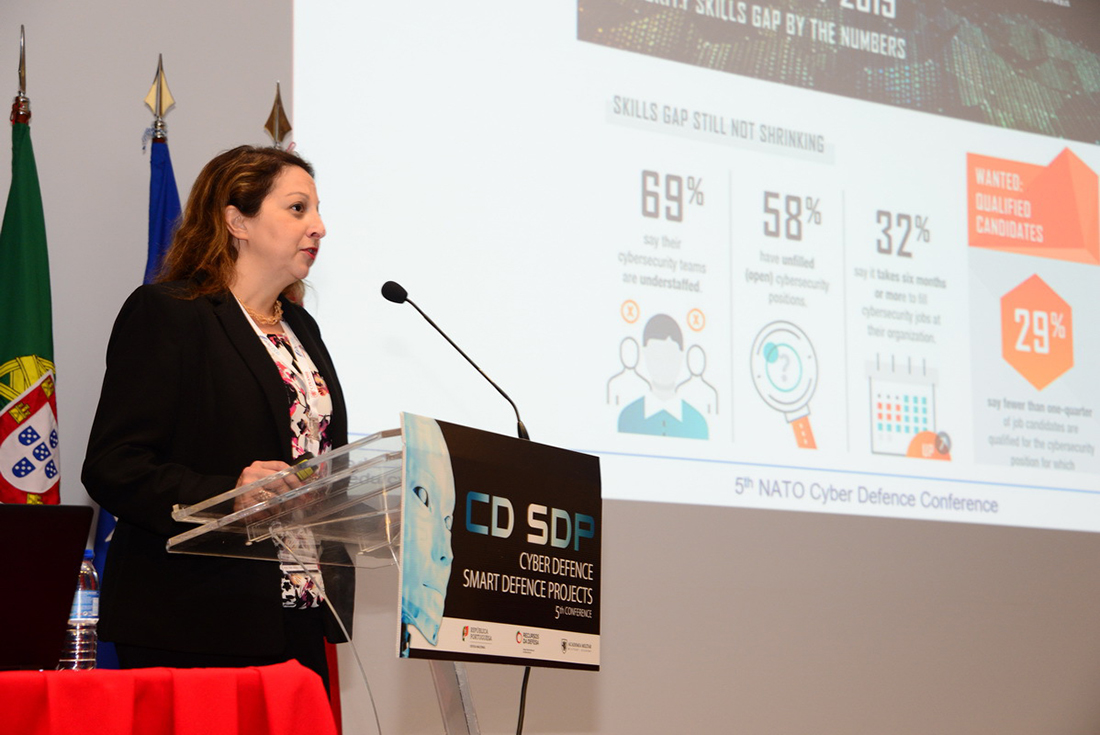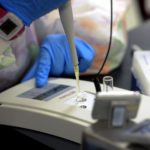UWF showcases cybersecurity initiatives on international stage at NATO cyber defence conference
Breaking barriers as the first U.S. academic institution to participate in the NATO Cyber Defence project, the University of West Florida showcased its cybersecurity initiatives this month on the international stage at the 5th NATO Cyber Defence Smart Defence Projects Conference.

Dr. Eman El-Sheikh, UWF Center for Cybersecurity director, presented both at the conference and the Multinational Cyber Defense Education and Training Project 20th Workshop on May 15-16 in Lisbon, Portugal. El-Sheikh represented the U.S. on the international stage along with Bobbie Sanders, Department of Defense Chief Information Officer, cyber workforce management directorate, and Brian Gouker, National Security Agency College of Cyber division chief and U.S. representative on the NATO Cyber Defence Project. El-Sheikh shared innovative cybersecurity higher education practices in the U.S. geared toward workforce development, including the Centers of Academic Excellence Program and UWF’s best practices and role as one of the nation’s eight CAE Regional Resource Centers.
“I was extremely honored and humbled to represent UWF and present on behalf of U.S. higher education and to share the stage with Portugal President Marcelo Rebelo de Sousa and cybersecurity world leaders,” El-Sheikh said. “The critical shortage of cybersecurity professionals is not a regional or national issue. It is a global crisis, and this conference focused on best practices and solutions to address it.”
UWF serves as the CAE Regional Resource Center for the Southeast as designated by the NSA and U.S. Department of Homeland Security. Established in 1999, the CAE Program includes 272 academic institutions designated as Centers of Academic Excellence in Cyber Defense Education. The program focuses on expanding the number of academic institutions that graduate qualified cybersecurity professionals.
UWF provides nationally-recognized cybersecurity education, research and workforce development. In 2018, the UWF Center for Cybersecurity launched its Cybersecurity for All Program to provide training and workforce development for businesses, government and defense organizations and address the critical shortage of cybersecurity professionals. Cybersecurity job openings in the nation top 300,000 according to Cyberseek.org. Cybersecurity Ventures, a provider of data and analytics for the industry, projects the global shortage of professionals to reach 3.5 million by 2021.
“NATO shares many of the cyber workforce development issues that we have in the United States,” Gouker said. “Not having sufficient cyber professionals or cyber educators are global issues. When Dr. El-Sheikh talked about the things UWF is doing in the U.S., it resonated with our European friends. We’ve shared our CAE program concepts with our NATO partners and highlighted UWF as a leader in the CAE Community.”
Lt. Col. Luis Salomão de Carvalho, project manager, NATO Multinational Cyber Defence Education and Training Project, invited El-Sheikh to the conference after attending the CAE Executive Leadership Forum on April 24-25 in Pensacola. Carvalho served as a panelist on international cybersecurity education initiatives at the forum. The UWF Center for Cybersecurity partnered with the NSA and DHS to host the national forum, which attracted approximately 300 executives in academia, business and government.
UWF will expand its cybersecurity initiatives and leadership at the international level. For NATO, Carvalho said those opportunities include participating in the Cyber Academia Working Group, developing cyber curriculum for the NATO Communications and Information Academy in Portugal, and sharing education, training and exercises to various audiences by utilizing the Florida Cyber Range, a virtual environment for advanced training and testing solutions that UWF launched with Metova CyberCENTS in 2017.
“With experience, knowledge, available resources and best practices, there are a number of initiatives for enhancing NATO cybersecurity and cyber defense,” Carvalho said. “The U.S. and other allies are ready to promote collaboration and support these efforts via the NSA/DHS CAE Program and the University of West Florida.”
For more information about the UWF Center for Cybersecurity, visit uwf.edu/cybersecurity.


